Zone Books149
Founded in 1985, Zone Books is an independent nonprofit publisher in the humanities and social sciences, with a special focus on interdisciplinary projects. Zone publishes original works by international scholars of philosophy, history, art history, cultural and sound studies, as well as political and social theory that have changed conversations across disciplines. Zone Books are designed by Julie Fry, based on an original concept by Bruce Mau.
Jonathan Crary, Michel Feher, Hal Foster, and Ramona Naddaff, Editors
-

How neoliberals turned to nature to defend inequality after the end of the Cold War
-

How the work of several contemporary artists illuminates and challenges the policing of European borders and identity
-

A historical, literary, and philosophical study that transforms our understanding of reading
-

Internationally renowned philosopher Giorgio Agamben’s bold redefinition of methodological inquiry into the human sciences
-
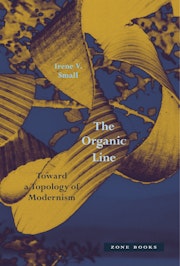
A major rethinking of twentieth-century abstract art mobilized by the work of Brazilian artist Lygia Clark
-
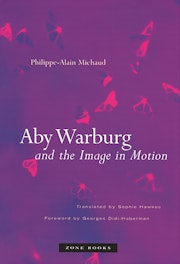
A compelling analysis of the work of art historian Aby Warburg and its radical implications for the study of visual images
-
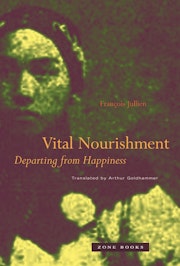
An intellectual history of the concept of life and body politics in Chinese philosophy
-
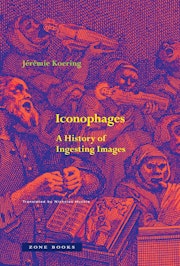
An unprecedented art-historical account of practices of image ingestion from ancient Egypt to the twentieth century
-
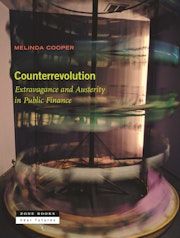
A thorough investigation of the current combination of austerity and extravagance that characterizes government spending and central bank monetary policy
-
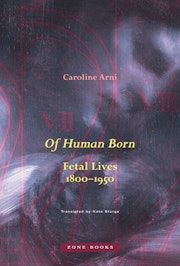
A new history of the concept of fetal life in the human sciences
-
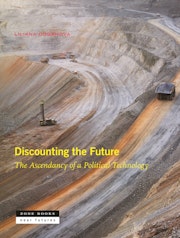
A pioneering exploration of the defining traits and contradictions of our relationship to the future through the lens of discounting
-
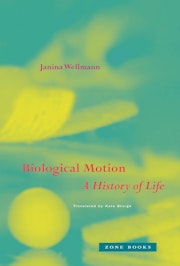
A captivating exploration of the changing definitions of life in biology
-
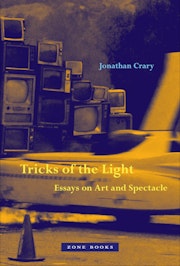
Essays on media systems and contemporary art by a leading theorist of modern visual culture
-
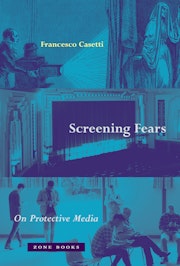
A historical and theoretical investigation of the unexpected ways screen-based media protect and excite viewers’ fears and anxieties of the world
-
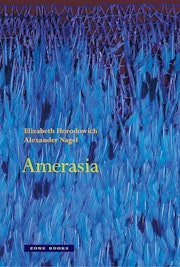
A connected world as imagined by early modern European artists, mapmakers, and writers, where Asia and the Americas were on a continuum
-
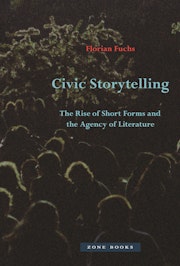
A deep history of storytelling as a civic agency, recalibrating literature’s political role for the twenty-first century
-
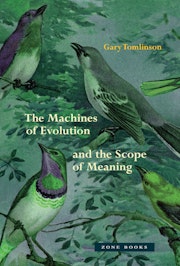
A groundbreaking account of the origin and place of meaning in the earthly biosphere
-
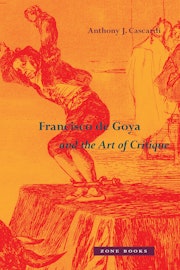
An innovative study of Goya's unprecedented elaboration of the critical function of the work of art
-
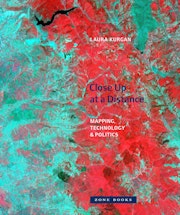
The past two decades have seen revolutionary shifts in our ability to navigate, inhabit, and define the spatial realm. The data flows that condition much of our lives now regularly include Global Positioning System (GPS) readings and...
-
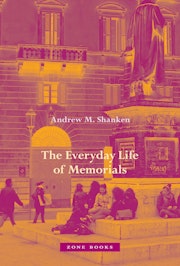
A timely study, erudite and exciting, about the ordinary—and oftentimes unseen—lives of memorials
-
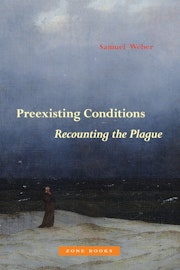
A stunning philosophical and literary account of canonical plague tales
-
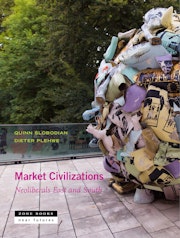
A deep investigation of neoliberalism's proselytizers in Eastern Europe and the Global South
-
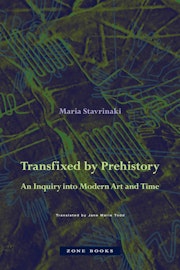
An examination of how modern art was impacted by the concept of prehistory and the prehistoric
-
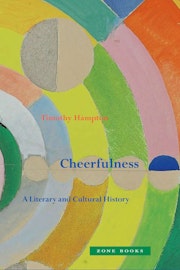
A timely story of a forgotten emotion
-
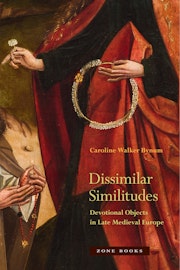
From an acclaimed historian, a mesmerizing account of how medieval European Christians envisioned the paradoxical nature of holy objects
-
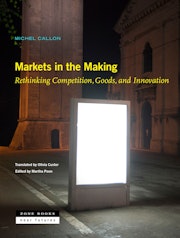
Slicing through blunt theories of supply and demand, Callon presents a rigorously researched but counterintuitive model of how everyday market activity gets produced.
-

From a leading art historian, a provocative exploration of the intersection of art, politics, and history in 1960s Italy
-

An examination of NASA's Golden Record that offers new perspectives and theories on how music can be analyzed, listened to, and thought about—by aliens and humans alike.
-

An intellectually adventurous account of the role of nonpersons that explores their depiction in literature and challenges how they are defined in philosophy, law, and anthropology
-

An imaginative new theory of likeness that ranges widely across history and subjects, from physics and evolution to psychology, language, and art
-
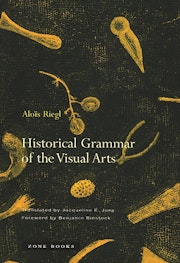
The first English translation of one of the earliest and most brilliant art-historical surveys, from one of the greatest modern art historians
-
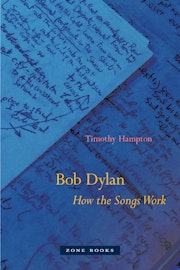
A career-spanning account of the artistry and politics of Bob Dylan’s songwriting
-
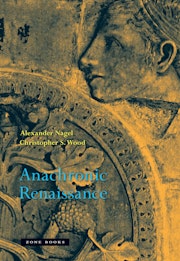
In this widely anticipated book, two leading contemporary art historians present a stunning reconsideration of the problem of time in the Renaissance. With intellectual brilliance, Alexander Nagel and Christopher S. Wood reexamine the...
-
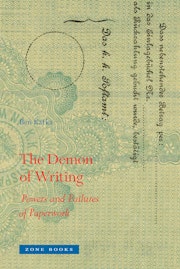
Since the middle of the eighteenth century, political thinkers of all kinds — radical and reactionary, professional and amateur — have been complaining about “bureaucracy.” But what, exactly, is all this complaining about?
The... -
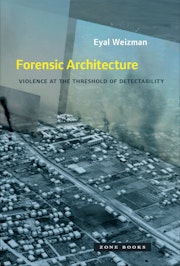
In recent years, a little-known research group named Forensic Architecture began using novel research methods to undertake a series of investigations into human rights abuses. Today, the group provides crucial evidence for international...
-
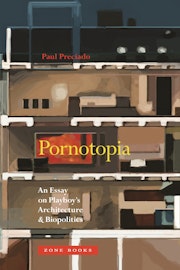
Published for the first time in 1953, Playboy was not only the first pornographic popular magazine in America; it also came to embody an entirely new lifestyle through the construction of a series of utopian multimedia spaces — from the...
-
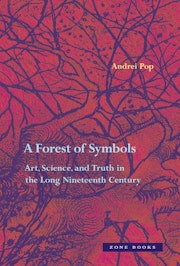
In this groundbreaking book, Andrei Pop presents a lucid reassessment of those writers and artists in the late nineteenth century whose work merits the adjective “symbolist.” For Pop, this term denotes an art that is self-conscious...
-
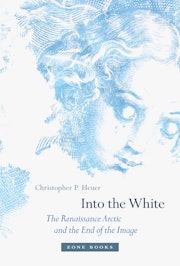
European narratives of the Atlantic New World tell stories of people and things: strange flora, wondrous animals, and sun-drenched populations for Europeans to mythologize or exploit. Yet between 1500 and 1700 one region upended all of...
-
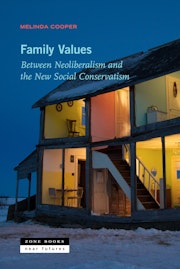
Why was the discourse of family values so pivotal to the conservative and free-market revolution of the 1980s and why has it continued to exert such a profound influence on American political life? Why have free-market neoliberals so...
-
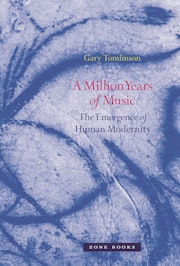
What is the origin of music? In the last few decades this centuries-old puzzle has been reinvigorated by new archaeological evidence and developments in the fields of cognitive science, linguistics, and evolutionary theory. In this...
-
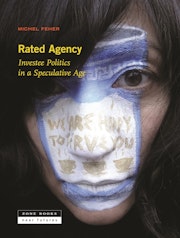
The hegemony of finance compels a new orientation for everyone and everything: companies care more about the moods of their shareholders than about longstanding commercial success; governments subordinate citizen welfare to appeasing...
-
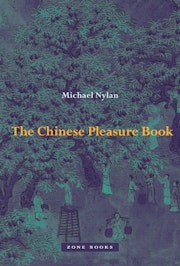 This book takes up one of the most important themes in Chinese thought: the relation of pleasurable activities to bodily health and to the health of the body politic. Unlike Western theories of pleasure, early Chinese writings contrast...
This book takes up one of the most important themes in Chinese thought: the relation of pleasurable activities to bodily health and to the health of the body politic. Unlike Western theories of pleasure, early Chinese writings contrast...
-
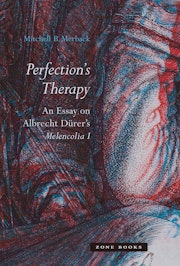
Albrecht Dürer’s master engraving, Melencolia I, has stood for centuries as a pictorial summa of knowledge about melancholia and an allegory of the limits of earthbound arts and sciences. Zealously interpreted since the nineteenth...
-
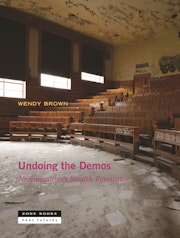
Neoliberal rationality — ubiquitous today in statecraft and the workplace, in jurisprudence, education, and culture — remakes everything and everyone in the image of homo oeconomicus. What happens when this rationality transposes...
-
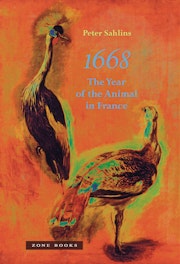
Peter Sahlins’s brilliant new book reveals the remarkable and understudied “animal moment” in and around 1668 in which authors (including La Fontaine, whose Fables appeared in that year), anatomists, painters, sculptors, and...
-
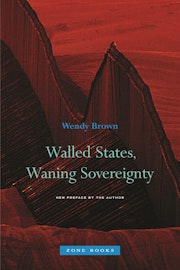
Why, just two decades after international celebrations of the fall of the Berlin Wall, are so many nation-states building elaborate walls at or near their borders? Why walls now, given growing global connectedness and given the general...
-
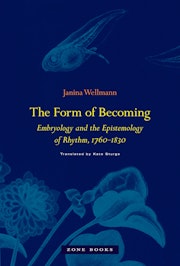
The Form of Becoming offers an innovative understanding of the emergence around 1800 of the science of embryology and a new notion of development, one based on the epistemology of rhythm. It argues that between 1760 and 1830, the...
-
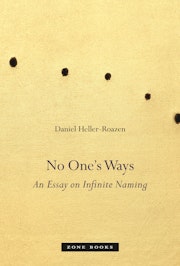
Homer recounts how, trapped inside a monster’s cave, with nothing but his wits, Ulysses once saved himself by twisting his name. He called himself Outis: “No One” or “Non-One,” “No Man” or “Non-Man.” The ploy was a...
-
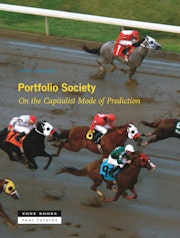
As financial markets expand and continue to refashion the world in their own image, the wealth of capitalist societies no longer presents itself as it did to Karl Marx in the nineteenth century, as a “monstrous collection of...
-
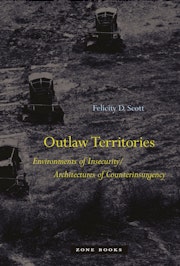
Outlaw Territories: Environments of Insecurity/Architectures of Counterinsurgency traces the relations of architecture and urbanism to forms of human unsettlement and territorial insecurity during the 1960s and ’70s. Investigating a...
-
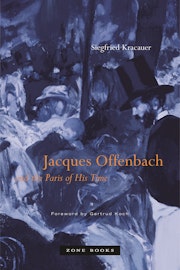
Siegfried Kracauer’s Jacques Offenbach and the Paris of His Time brilliantly reconfigures the biography form into a remarkable work of social and cultural history. In a book that has frequently been compared with Walter Benjamin’s...
-
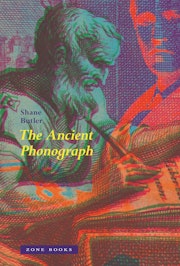
Long before the invention of the phonograph, the written word was unrivaled as a medium of the human voice. In The Ancient Phonograph, Shane Butler takes us back to an age, long before Edison, when writing itself was still relatively...
-
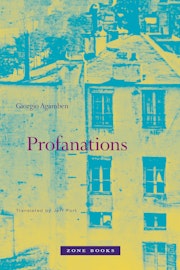
The Italian philosopher Giorgio Agamben has always been an original reader of texts, understanding their many rich and multiple historical, aesthetic, and political meanings and effects. In Profanations, Agamben has assembled for the...
-
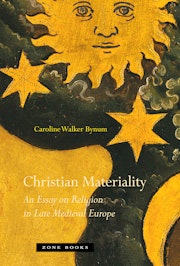
In the period between 1150 and 1550, an increasing number of Christians in western Europe made pilgrimage to places where material objects — among them paintings, statues, relics, pieces of wood, earth, stones, and Eucharistic wafers...
-
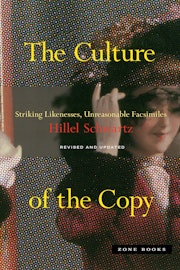
The Culture of the Copy is an unprecedented attempt to make sense of the Western fascination with replicas, duplicates, and twins. In a work that is breathtaking in its synthetic and critical achievements, Hillel Schwartz charts the...
-
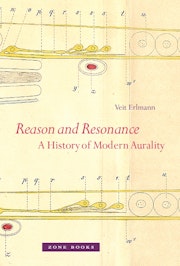
Hearing has traditionally been understood as the second sense — less rational and modern than seeing, the master of all senses, the first sense. Reason and Resonance is the first full-length study to explode this myth by...
-
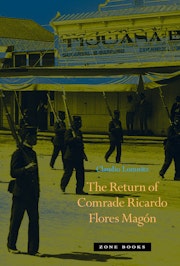
In this long-awaited study, Claudio Lomnitz tells an unprecedented story about the experience and ideology of American and Mexican revolutionary collaborators of the Mexican anarchist Ricardo Flores Magón. Based on extensive research...
-
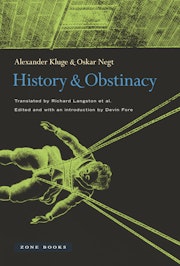
If Marx’s opus Capital provided the foundational account of the forces of production in all of their objective, machine formats, what happens when the concepts of political economy are applied not to dead labor, but to its living...
-
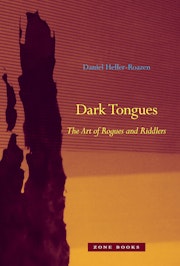
Dark Tongues constitutes a sustained exploration of a perplexing fact that has never received the attention it deserves. Wherever human beings share a language, they also strive to make from it something new: a cryptic idiom, built from...
-
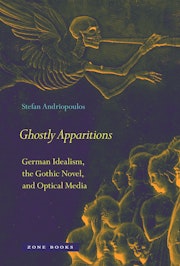
Drawing together literature, media, and philosophy, Ghostly Apparitions provides a new model for media archaeology and its transformation of intellectual and literary history. Stefan Andriopoulos examines new media technologies and...
-
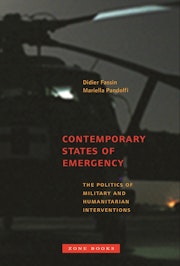
From natural disaster areas to zones of conflict around the world, a new logic of intervention has emerged. This new post-Cold War international order combines military action and humanitarian aid, conflates moral imperatives and...
-
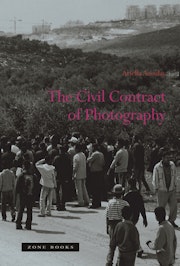
In this groundbreaking work, Ariella Azoulay thoroughly revises our understanding of the ethical status of photography. It must, she insists, be understood in its inseparability from the many catastrophes of recent history. She argues...
-
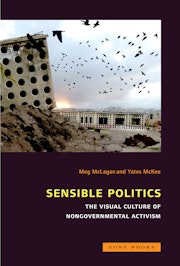
Political acts are encoded in medial forms — feet marching on a street, punch holes on a card, images on live stream, tweets — that have force, shaping people as subjects and constituting the contours of what is sensible, legible...
-
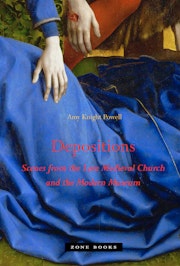
From late medieval reenactments of the Deposition from the Cross to Sol Lewitt’s “Buried Cube,” Depositions is about taking down images and about images that anticipate being taken down. Foretelling their own depositions, as well...
-
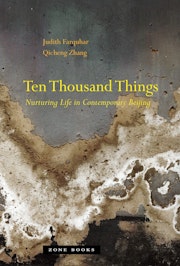
Ten Thousand Things explores the many forms of life, or, in ancient Chinese parlance “the ten thousand things” that life is and is becoming, in contemporary Beijing and beyond. Coauthored by an American anthropologist and a Chinese...
-
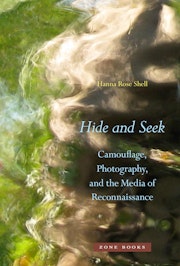
Camouflage is an adaptive logic of escape from photographic representation. In Hide and Seek, Hanna Rose Shell traces the evolution of camouflage as it developed in counterpoint to technological advances in photography, innovations in...
-
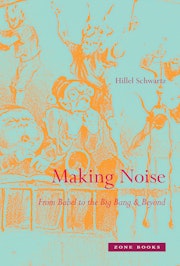
When did the “silent deeps” become cacophonous and galaxies begin to swim in a sea of cosmic noise? Why do we think that noises have colors and that colors can be loud? How loud is too loud, and says who? Attending to sounds at once...
-
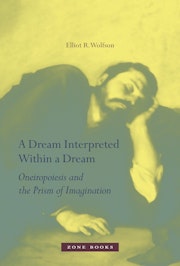
Dreams have attracted the curiosity of humankind for millennia. Elliot R. Wolfson’s A Dream Interpreted Within a Dream: Oneiropoiesis and the Prism of Imagination grapples with the allusive and elusive place dreaming occupies in the...
-
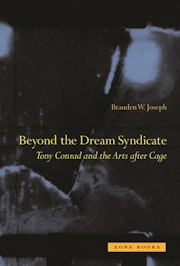
Tony Conrad is exemplary of the 1960s artist who remains inassimilable to canonic histories. Creator of the “structural” film, The Flicker, collaborator on Jack Smith’s Flaming Creatures and Normal Love, follower of Henry...
-
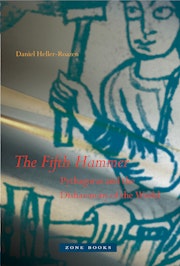
An ancient tradition holds that Pythagoras invented harmony. It is said that one day, he wandered by a forge and, hearing a wondrous sound come from within, ventured in to investigate. He found five men hammering with five hammers. To...
-
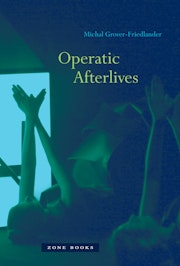
In Operatic Afterlives, Michal Grover-Friedlander examines the implications of opera’s founding myth — the story of Orpheus and Eurydice: Orpheus’s attempt to revive the dead Eurydice with the power of singing. Traditionally...
-
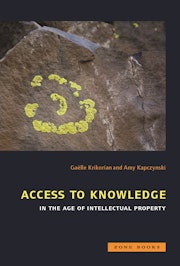
The end of the twentieth century saw an explosive intrusion of intellectual property law into everyday life. Expansive copyright laws have been used to attack new forms of sharing and remixing facilitated by the Internet. International...
-
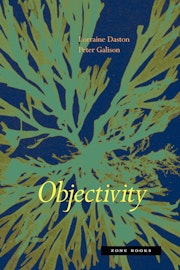
Objectivity has a history, and it is full of surprises. In Objectivity, Lorraine Daston and Peter Galison chart the emergence of objectivity in the mid-nineteenth-century sciences — and show how the concept differs from alternatives...
-
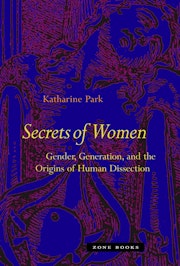
Toward the end of the Middle Ages, medical writers and philosophers began to devote increasing attention to what they called “women’s secrets,” by which they meant female sexuality and generation. At the same time, Italian...
-
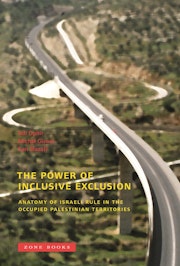
On the eve of its fifth decade, the Israeli occupation in the Palestinian territories can no longer be considered a temporary aberration. In the shadow of the Oslo process, the second Intifada and the “disengagement” from and...
-
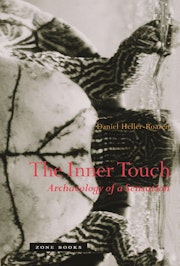
This book presents the archaeology of a single sense: the sense of being sentient. Aristotle was perhaps the first to define this faculty when, in his treatise On the Soul, he identified a sensory power irreducible to the five senses...
-
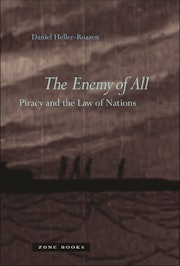
The pirate is the original enemy of humankind. Before humanitarian organizations, human rights, and the establishment of international law in the early modern period, the Roman statesmen already made this point perfectly clear. As...
-
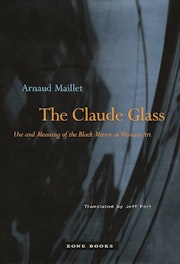
In this first full-length study of a largely forgotten optical device from the eighteenth century, Arnaud Maillet reconfigures our historical understanding of visual experience and meaning in relation to notions of opacity...
-
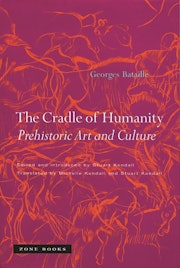
The Cradle of Humanity: Prehistoric Art and Culture collects essays and lectures by Georges Bataille spanning thirty years of research in anthropology, comparative religion, aesthetics, and philosophy. These were neither idle nor...
-
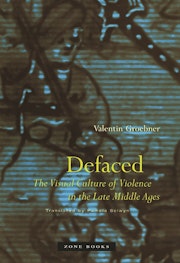
From the fourteenth century on, the artifacts of Western visual culture became increasingly violent. Destroyed faces, dissolved human shapes, devilish doppelgängers of the sacred: violence made real people nameless exemplars of...
-
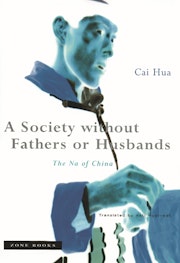
The Na of China, farmers in the Himalayan region, live without the institution of marriage. Na brothers and sisters live together their entire lives, raising the women’s children. Since, like other societies, the Na respect the incest...
-
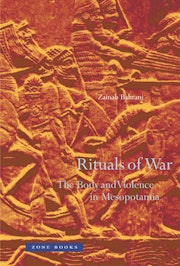
Rituals of War is an investigation into the earliest historical records of violence and biopolitics. In Mesopotamia, ancient Iraq (ca. 3000–500 BC) rituals of war and images of violence constituted part of the magical technologies of...
-
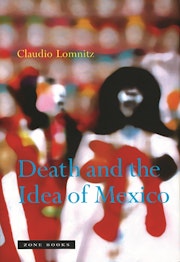
Death and the Idea of Mexico is the first social, cultural, and political history of death in a nation that has made death its tutelary sign. Examining the history of death and of the death sign from the sixteenth-century holocaust to...
-
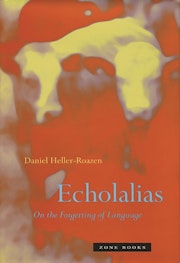
Just as speech can be acquired, so can it be lost. Individuals can forget words, phrases, even entire languages, and over the course of time speaking communities, too, let go of the tongues that were once theirs, as languages grow...
-
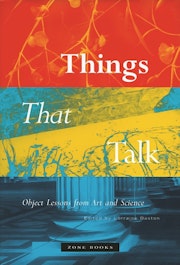
Imagine a world without things. There would be nothing to describe, explain, remark on, interpret, or complain about. Without things, we would, in short, stop speaking; we would become as mute as objects are alleged to be. In nine...
-
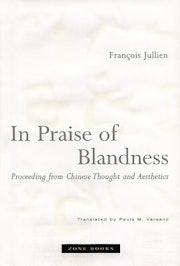
The quality of blandness: no sooner do you identify it then it begins to appear at every turn. Blandness, by definition, pays little heed to the borders our various disciplines like to draw. As the embodiment of neutrality, the bland...
-
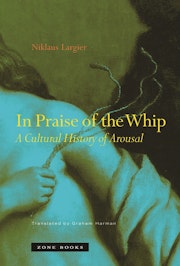
In Praise of the Whip: A Cultural History of Arousal is a new history of voluntary flagellation in Europe, from its invention in medieval relgious devotion to its use in the modern pornographic imagination. Working with a wide range of...
-
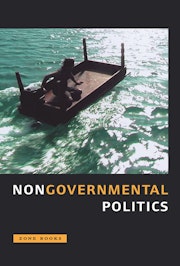
To be involved in politics without aspiring to govern, be governed by the best leaders, or abolish the institutions of government: such are the constraints that delineate the condition common to all practitioners of nongovernmental...
-
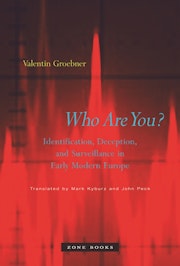
Who are you? And how can you prove it? How were individuals described and identified by people who had never seen them before, in the centuries before photography and fingerprinting, in a world without centralized administrations, where...
-
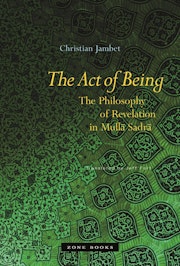
This recent study by Christian Jambet explores the essential elements of the philosophical system of Mullā Sadrā Shīrāzī, an Iranian Shi‘ite of the seventeenth century. The writings of Mullā Sadrā Shīrāzī (d. 1640) bear...
-
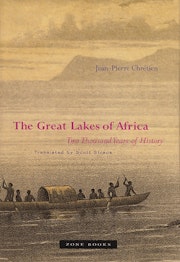
Although the genocide of 1994 catapulted Rwanda onto the international stage, English-language historical accounts of the Great Lakes region of Eastern Africa are still scarce. Drawing on a wide range of sources — colonial archives...
-
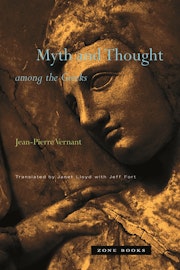
“Myth and Thought among the Greeks is Jean-Pierre Vernant’s magisterial first entry upon the scene of classical studies. As fresh and challenging as it was when first published in 1965, this new edition of his eighteen essays, which...
-
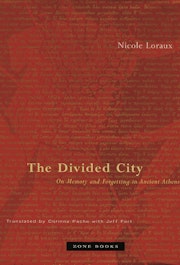
Athens, 403 BCE. The end of the bloody oligarchic dictatorship of the Thirty. The democrats return to the city victorious. Renouncing vengeance, in an act of amnesia, citizens call for — if not invent — amnesty. They agree to forget...
-
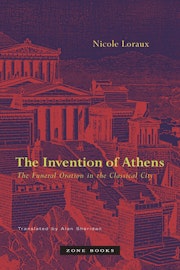
How does the funeral oration relate to democracy in ancient Greece? How did the death of an individual citizen-soldier become an occasion to praise the city of Athens? In The Invention of Athens, Nicole Loraux traces the different...
-
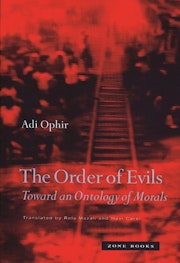
What remains of moral judgment when truth itself is mistrusted, when the validity of every belief system depends on its context, when power and knowledge are inextricably entangled? Is a viable moral theory still possible in the wake of...
-
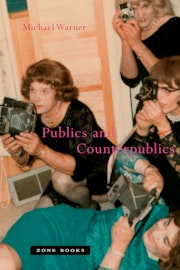
Publics and Counterpublics revolves around a central question: What is a public? The idea of a public is a cultural form, a kind of practical fiction, present in the modern world in a way that is very different from other or earlier...
-
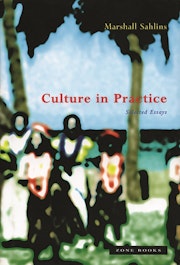
Culture in Practice collects both the seminal and the more obscure academic and political writings of the anthropologist Marshall Sahlins from the 1960s through the 1990s. More than a compilation, this book unfolds as an intellectual...
-
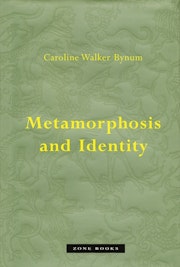
In Metamorphosis and Identity, award-winning historian Caroline Walker Bynum explores the Western obsession with the nature of change and personal identity. Focusing on the twelfth and thirteenth centuries, but concerned as well with...
-
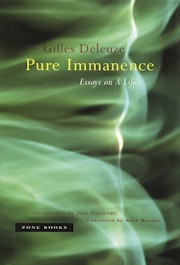
Pure Immanence collects the essays of Gilles Deleuze on a complex theme at the heart of his philosophy. In his last piece of writing, included here, Deleuze gives a simple name to this problem: “a life.” Newly translated and...
-
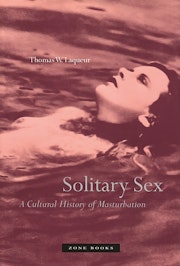
A historical account of masturbation as a moral issue and cultural taboo.
-
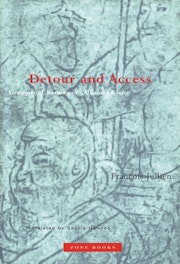
In Detour and Access, François Jullien investigates the subtlety, strategy, and production of meaning in ancient and modern Chinese aesthetic texts and political events. Moving between the rhetorical traditions of ancient Greece and...
-
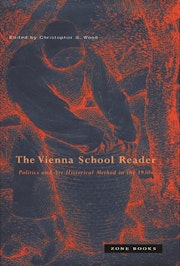
This volume introduces to an English-language audience the writings of the so-called new Vienna School of art history. In the 1930s, Hans Sedlmayr and Otto Pächt undertook an ambitious extension of the art historical project of Aloïs...
-

A wide-ranging, interdisciplinary conceptual history of the changing meanings and metaphors of “action” and “reaction”
-
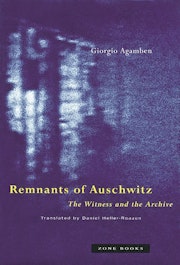
“In its form, this book is a kind of perpetual commentary on testimony. It did not seem possible to proceed otherwise. At a certain point, it became clear that testimony contained at its core an essential lacuna; in other words, the...
-
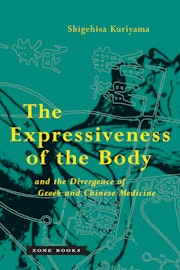
An illuminating account of how early medicine in Greece and China perceived the human body
Winner of the William H. Welch Medal, American Association for the History of Medicine -
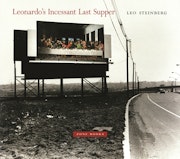
A picture universally recognized, endlessly scrutinized and described, incessantly copied, adapted, lampooned: does Leonardo’s near-ruined Last Supper still offer anything new to be seen or to be said? This book is a resounding Yes to...
-
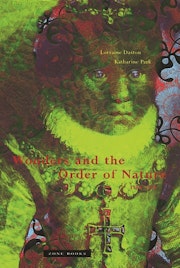
Wonders and the Order of Nature is about the ways in which European naturalists from the High Middle Ages through the Enlightenment used wonder and wonders, the passion and its objects, to envision themselves and the natural world....
-
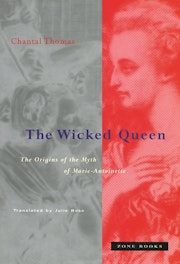
The Wicked Queen is not a biography of one of the most infamous queens in history. Rather, Chantal Thomas presents the history of the verbal and visual representations of Marie-Antoinette, the history of her mythification. Almost as...
-
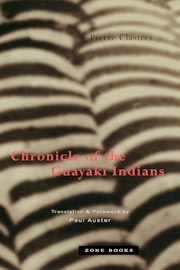
Chronicle of the Guayaki Indians is Pierre Clastres’s account of his 1963–64 encounter with this small Paraguayan tribe, a precise and detailed recording of the history, ritual, myths, and culture of this remarkably unique, and now...
-
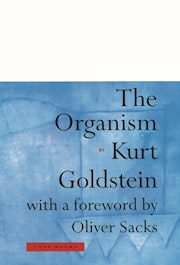
In this remarkable book by one of the great psychologists and neurologists of the early twentieth century, Kurt Goldstein presents a summation of his “holistic” theory of the human organism. In the course of his studies on...
-
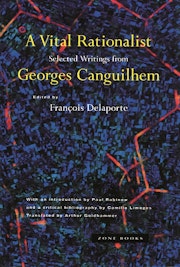
Georges Canguilhem is one of France’s leading philosophers and historians of science. Trained as both a medical doctor and a philosopher, Canguilhem overlapped these practices to demonstrate that there could be no epistemology without...
-
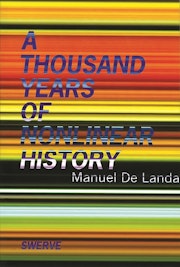
Following in the wake of his groundbreaking work War in the Age of Intelligent Machines, Manuel De Landa presents a brilliant, radical synthesis of historical development of the last thousand years. A Thousand Years of Nonlinear History...
-
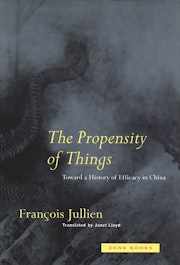
In this strikingly original contribution to our understanding of Chinese philosophy, François Jullien uses the Chinese concept of shi — disposition or circumstance, power or potential — as a touchstone to explore Chinese culture...
-
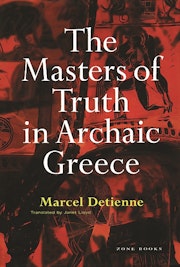 The Masters of Truth in Archaic Greece traces the odyssey of “truth,” Aletheia, from mythoreligious to philosophical thought in archaic Greece. Marcel Detienne’s starting point is a simple observation: In archaic Greece, three...
The Masters of Truth in Archaic Greece traces the odyssey of “truth,” Aletheia, from mythoreligious to philosophical thought in archaic Greece. Marcel Detienne’s starting point is a simple observation: In archaic Greece, three...
-
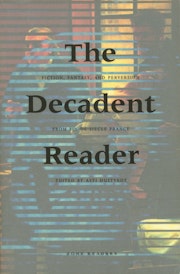 In fin-de-siècle France, progress and material prosperity coincided with widespread alarm about disease and decay. The obsessions of our own culture at the end of the millennium resonated in a striking manner with those of the last fin...
In fin-de-siècle France, progress and material prosperity coincided with widespread alarm about disease and decay. The obsessions of our own culture at the end of the millennium resonated in a striking manner with those of the last fin...
-
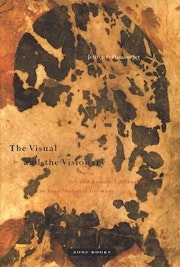
The Visual and the Visionary puts the study of female spirituality on a new footing and provides a nuanced account of the changing role of images in medieval monasticism from the twelfth century to the Reformation. In ten essays...
-
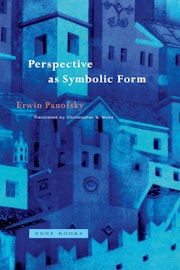
Erwin Panofsky’s Perspective as Symbolic Form is one of the great works of modern intellectual history, the legendary text that has dominated all art-historical and philosophical discussions on the topic of perspective in this...
-
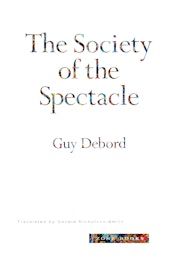
Few works of political and cultural theory have been as enduringly provocative as Guy Debord’s Society of the Spectacle. From its publication amid the social upheavals of the 1960s to the present, the volatile theses of this book have...
-
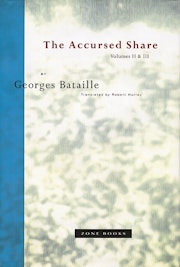
Georges Bataille considered The Accursed Share, his radical critique of economic theories based on rational categories of need, scarcity, and utility, his most important project. In Volume I, he announced two further volumes, The...
-
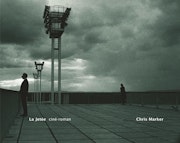
La Jetée is the book version of the legendary 1964 science fiction film about time and memory after a nuclear apocalypse. Chris Marker, the undisputed master of the filmic essay, composed the film almost entirely of still...
-
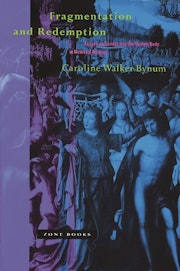
Fragmentation and Redemption is first of all about bodies and the relationship of part to whole in the high Middle Ages, a period in which the overcoming of partition and putrefaction was the very image of paradise. It is also a study...
-
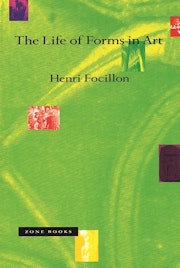
In this beautiful meditation on the art-historical problem of style, Henri Focillon (1881–1943) describes how art forms change over time. Although he argues that the development of art is irreducible to external political, social, or...
-
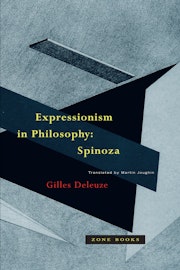
In this remarkable work, Gilles Deleuze, the renowned French philosopher, reflects on one of the thinkers of the past who most influenced his own sweeping reconfiguration of the tasks of philosophy. For Deleuze, Spinoza, along with...
-
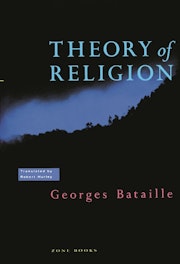
Theory of Religion brings to philosophy what Georges Bataille’s earlier book The Accursed Share brought to anthropology and history, namely, an analysis based on notions of excess and expenditure. No other work of Bataille’s, and...
-
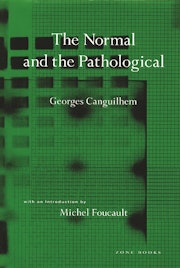
The Normal and the Pathological is one of the crucial contributions to the history of science in the last half century. It takes as its starting point the sudden appearance of biology as a science in the nineteenth century and examines...
-
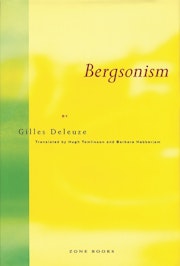
What is needed for something new to appear? According to Gilles Deleuze, one of the most brilliant of contemporary philosophers, this question of “novelty” is the major problem posed by Bergson’s work. In Bergsonism, Deleuze...
-
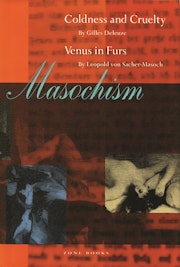
In his stunning essay Coldness and Cruelty Gilles Deleuze provides a rigorous and informed philosophical examination of the work of late nineteenth-century German novelist Leopold von Sacher-Masoch. Deleuze’s essay, certainly the most...
-
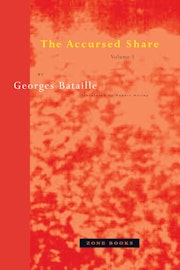
From the acclaimed French philosopher, intellectual, and novelist, a brilliant account of the social and economic costs of civilization
-
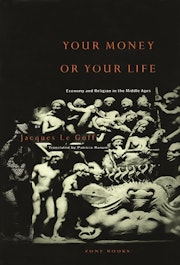 In this book, one of the most esteemed contemporary historians of the Middle Ages presents a concise examination of the problem that usury posed for the medieval Church, which had long denounced the lending of money for interest....
In this book, one of the most esteemed contemporary historians of the Middle Ages presents a concise examination of the problem that usury posed for the medieval Church, which had long denounced the lending of money for interest....
-
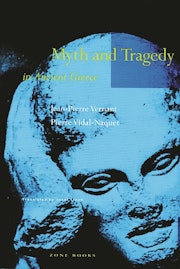 Jean-Pierre Vernant and Pierre Vidal-Naquet are leaders in a contemporary French classical scholarship that has produced a stunning reconfiguration of Greek thought and literature. In this work, the authors present a disturbing and...
Jean-Pierre Vernant and Pierre Vidal-Naquet are leaders in a contemporary French classical scholarship that has produced a stunning reconfiguration of Greek thought and literature. In this work, the authors present a disturbing and...
-
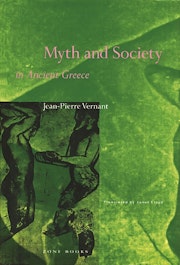
In this groundbreaking study, Jean-Pierre Vernant delineates a compelling new vision of ancient Greece. Myth and Society in Ancient Greece takes us far from the calm and familiar images of Polykleitos and the Parthenon to reveal a...
-
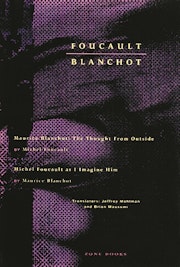 In these two essays, two of the most important French thinkers of our time reflect on each other’s work. In so doing, novelist/essayist Maurice Blanchot and philosopher Michel Foucault develop a new perspective on the relationship...
In these two essays, two of the most important French thinkers of our time reflect on each other’s work. In so doing, novelist/essayist Maurice Blanchot and philosopher Michel Foucault develop a new perspective on the relationship...
-
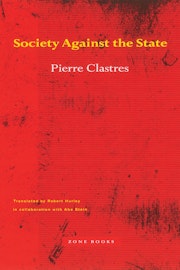
In this seminal, founding work of political anthropology, Pierre Clastres takes on some of the most abiding and essential questions of human civilization: What is power? What is society? How, among all the possible modes of political...
-
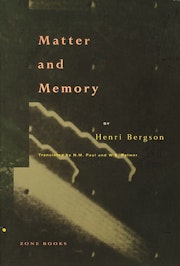
“Since the end of the last century,” Walter Benjamin wrote, “philosophy has made a series of attempts to lay hold of the ‘true’ experience as opposed to the kind that manifests itself in the standardized, denatured life of the...